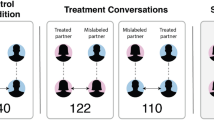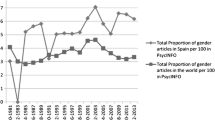Abstract
The Gendered Conference Campaign seeks to reduce the prevalence of conferences at which the keynote speakers are all male. Such conferences, according to proponents of the campaign, stereotype philosophy as male, contribute to implicit bias against women and perpetuate stereotype threat. I argue, first, that if a more diverse list of keynote speakers were the correct way to counter harms such as implicit bias and stereotype threat, then a Gendered Conference Campaign would not be the solution. The campaign would need to include other groups that are the victims of implicit bias and stereotype within philosophy. Other challenges to proponents of the Gendered Conference Campaign are then presented.
Similar content being viewed by others
Notes
http://feministphilosophers.wordpress.com/gendered-conference-campaign/ 10 December 2009, (Accessed 21 September 2012).
Ibid.
Ibid. Stereotype threat is the psychological phenomenon that arises from being aware of a stereotype about a group to which one belongs. In some situations the awareness of that stereotype generates anxiety that enables the stereotype to influence one’s behaviour in a stereotype-reinforcing manner. See, for example, Steele (2010).
This is the (inaccurate) terminology used. They are not referred to as conferences with only male keynote speakers, but as ‘all male conferences’, even though many of those speaking at the conference may be female.
‘Gendered conference campaign letter January 3, 2011’, http://feministphilosophers.wordpress.com/2011/01/03/gendered-conference-campaign-letter/ (Accessed, 21 September 2012).
http://feministphilosophers.wordpress.com/gendered-conference-campaign/ 10 December 2009, (Accessed 21 September 2012).
‘GCC FAQ’, September 3, 2011, http://feministphilosophers.wordpress.com/2011/09/03/gcc-faq/. Accessed 21 September 2012.
There is something unseemly about the mindless displays of political correctness in determining whom to include. In one case an anonymous commentator (going by the name ‘Underrepresented Philosopher’) lists a string of contemporary philosophers, some of whom are clearly included on the grounds of their ‘exotic’ sounding names, leading perhaps to the commentator’s assumption that they are of Latino or Arab origin. Others on the list are leaders in the field and there is absolutely no evidence that they are the victims of bias, implicit or otherwise. (http://www.newappsblog.com/2011/12/why-a-gendered-conference-campaign-and-not-a-racedisabled-conference-campaign-.html) Accessed 3 January 2014.
This is not to justify them. Even positive biases can do mischief.
This strikes me a ridiculous phrase. (Should we describe ‘whites’ as ‘colourless people’?) However, because the phrase is so widely used, I’ll follow suit, indicating my reservations with the scare quotes.
The Gendered Conference Campaign says the following:
Women are often at lower-prestige institutions, in lower ranked jobs. This means they’re likely to have less access to funds. (In a recent poll, we found that lack of funds was the top reason women declined invitations.) One way to make it more possible for women to attend would be to prioritise funding for those with less resources to draw upon. The super-famous often have super- big research accounts too. So go ahead and ask if they can self-fund. (If they’re offended by the question, they’re arseholes and you don’t want them at your conference. (http://feministphilosophers.wordpress.com/2011/03/26/how-to-avoid-a-gendered-conference/) Accessed 1 January 2014.
Since institutions in the ‘global south’ are typically ‘lower-prestige institutions’, this rationale would extend to philosophers in these parts of the world. One also wonders whether the Gendered Conference Campaign would favour funding for a more junior male from the less prestigious institution over a more senior female from a more prestigious one. If not, then the point about access to funds looks like an excuse rather than a disadvantage that supporters of the Campaign are actually interested in.
‘GCC FAQ’, September 3, 2011, http://feministphilosophers.wordpress.com/2011/09/03/gcc-faq/. Accessed 21 September 2012.
This argument was advanced by Catarina Dutilh Novaes, ‘Why a Gendered Conference Campaign and not a Race/Disability Conference Campaign?’ (http://www.newappsblog.com/2011/12/why-a-gendered-conference-campaign-and-not-a-racedisabled-conference-campaign-.html) Accessed 3 January 2014.
Attention to socio-economic and educational deficits are not necessary in the case of ‘non-minority’ women in western countries as women in these countries suffer no such deficit. Indeed, it is boys who are doing less well in schools.
This argument seems implicitly rather than explicitly stated in Catarina Dutilh Novaes, ‘Why a Gendered Conference Campaign and not a Race/Disability Conference Campaign?’ (http://www.newappsblog.com/2011/12/why-a-gendered-conference-campaign-and-not-a-racedisabled-conference-campaign-.html) Accessed 3 January 2014.
This assumes, again, that we are speaking about philosophers in the developed world.
This is one reason why it is not paternalistic to say to female advocates and supporters of the Gendered Conference Campaign that such a campaign is the wrong way to address bias against them. Although groups that are the victims of discrimination should have significant freedom to decide how best to respond to that discrimination, there are obvious limits on that freedom. They are not at liberty to act wrongly—including unfairly—in response to discrimination against them.
The Gendered Conference Campaign says that one of the harms of male-only keynote speakers is ‘at times the reinscription of the same few male names as the only leaders in their specialty’ (‘GCC FAQ’, September 3, 2011, http://feministphilosophers.wordpress.com/2011/09/03/gcc-faq/. Accessed 21 September 2012.). There is, of course, the danger that the Gendered Conference Campaign could at times lead to the reinscription of the same few female names as the ones to invite when one needs to invite a woman. Are supporters of the Gendered Conference Campaign similarly concerned about that possibility?
I discuss this and other examples in Benatar (2012).
In Benatar (2012, 212-238), I argue against sex-based affirmative action to rectify sexism against either males or females.
http://onlinelibrary.wiley.com/journal/10.1111/(ISSN)1527-2001/homepage/EditorialBoard.html (Accessed 24 September 2013).
At least, that is what can be gleaned from the announcements of those conferences.
Of course, this argument does not address the objection that underrepresented groups other than females were not included in at least some of the above conferences.
Jennifer Saul writes about the problems of Philosophy being ‘stereotyped as male’ (Saul 2013). However, there seems little concern that feminism is being stereotyped as female.
There is some evidence of bias against non-prestigious institutions, even within the developed world. See Peters and Ceci (1982). This study and its findings are not uncontroversial, which is why I have said that it provides ‘some’ evidence. That said, it would be surprising if institutional affiliation played no role.
Jennifer Saul (2013) correctly notes that implicit bias against women is not only unfair, but also bad for philosophy:
To get the best possible philosophy being done, we need the best philosophers to receive proper encouragement and good jobs, and to be working in environments where they can produce their best work. … Until we successfully do something about implicit bias and stereotype threat, this is not happening.
I am suggesting that this interest in benefiting philosophy be extended to feminists engaging seriously with views with which they disagree. For example, at the American Philosophical Association Eastern Division Meeting in December 2013, the Committee on the Status of Women organized a session on inclusiveness in conference invitations. All three of the speakers propounded the orthodox view.
Because I am among those who could provide a critical perspective, it might be suggested that I am guilty of the self-serving that I said appears to be true of female advocates of the Gendered Conference Campaign. However, there are some crucial differences. I am not engaged in any campaign and my observation about the importance of hearing alternative views is offered in the full realization that it is unlikely to alter any behaviour. The Gendered Conference Campaign, by contrast, is a campaign and it is aiming at a realizable goal—a considerable increase in the number of female keynotes.
I am grateful to an anonymous reviewer for some helpful suggestions.
References
Benatar, D. (2012). The second sexism: discrimination against men and boys. Malden MA: Wiley-Blackwell
Burtt, K. (1998). Male nurses still face bias. The American Journal of Nursing, 98(9), 64–65.
Cushman, P. (2005). Let’s hear it from the males: issues facing male primary school teachers. Teaching and Teacher Education, 21, 227–240.
Gordon, T., & Draper, T. W. (1982). Sex bias against male workers in day care. Child Care Quarterly, 11(3), 215–217.
Isaacs, D., & Poole, M. (1996). Being a man and becoming a nurse: three men’s stories. Journal of Gender Studies, 5(1), 39–47.
Kelly, N., Shoemaker, M., & Steel, T. (1996). The experience of being a male student nurse. Journal of Nursing Education, 35(4), 170–174.
O’Lynn, C. E. (2004). Gender-based barriers for male students in nursing education programs: prevalence and perceived importance. Journal of Nursing Education, 43(5), 229–236.
Peters, D. P., & Ceci, S. J. (1982). Peer-review practices of psychological journals: the fate of published articles, submitted again. The Behavioral and Brain Sciences, 5, 187–195.
Saul, J. (2013). Implicit bias, stereotype threat and women in Philosophy. In F. Jenkins & K. Hutchison (Eds.), Women in Philosophy: What needs to change? Oxford: Oxford University Press.
Steele, C. M. (2010). Whistling Vivaldi: And other clues to how stereotypes affect us. New York: W.W. Norton.
Author information
Authors and Affiliations
Corresponding author
Rights and permissions
About this article
Cite this article
Benatar, D. The Gendered Conference Campaign: A Critique. Philosophia 43, 13–23 (2015). https://doi.org/10.1007/s11406-014-9563-5
Received:
Revised:
Accepted:
Published:
Issue Date:
DOI: https://doi.org/10.1007/s11406-014-9563-5




